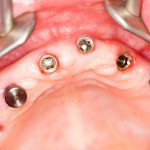
This review by Menini et al aimed to evaluate the prognosis of immediately loaded full-arch prostheses supported by both upright and tilted implants in the maxillae, after at least 1 yr. of function.
The authors searched the PubMed, Cochrane Central Register of Controlled Trials (CENTRAL), and EMBASE databases for human studies that included participants of any age having immediately loaded rehabilitation of the edentulous maxilla supported by both upright and tilted implants. The studies had to have a minimum of 10 patients, follow up of at least 12 months with the loading being applied within 48hrs of surgery. Studies needed to provide sufficient information to allow survival data to be calculated. Screening and data extraction was conducted independently and in duplicate.
- 11 studies were included in a meta-analysis, 3 retrospective studies, 7 prospective single-cohort studies, and 1 was a prospective controlled study.
- The studies included 1,623 implants (778 tilted, 845 upright) inserted into the maxillae of 324 patients.
- 17 tilted (2.19%) and 16 upright implants (1.89%) failed during the first year. There was no significant difference in failure rate (p value = 0.52)
The authors concluded
Tilted implants demonstrated a favorable short-term prognosis in full-arch immediate loading rehabilitations of the maxillae. Randomized long-term trials are needed to better elucidate long-term success of tilted vs. upright-positioned implants
Comment
This review only reports on short term outcomes a fact noted by the authors. As it considers full arch rehabilitation it also raises issues about the way in which the analysis is conducted as we are talking about the placement of several implants supporting dentures and as a consequence they are not independant of each other and so some account of clustering should be taken into account. The meta-analysis also combines both pro- and retrospective study designs and it may have been useful to analyse these separately as well all together.
This meta-analysis included a few more studies than an earlier review conducted by Del Fabbro but considering the increasing number of implants that are placed on a daily basis it is a sad fact that few high quality randomised controlled trials have been conducted in order to inform both patients and practitioners. This is evidenced by the fact that the systematic reviews that have been conducted by the Cochrane Collaboration ( Esposito et al ) have only been able to find small numbers of trials of variable quality to answer their questions.
Links
Menini M, Signori A, Tealdo T, Bevilacqua M, Pera F, Ravera G, Pera P. Tilted implants in the immediate loading rehabilitation of the maxilla: a systematic review. J Dent Res. 2012 Sep;91(9):821-7. Epub 2012 Jul 31. PubMed PMID: 22851285.
Del Fabbro M, Bellini CM, Romeo D, Francetti L. Tilted Implants for the Rehabilitation of Edentulous Jaws: A Systematic Review. Clin Implant Dent Relat Res. 2010 May 13. doi: 10.1111/j.1708-8208.2010.00288.x. [Epub ahead of print] PubMed PMID: 20491823.
Esposito M, Murray-Curtis L, Grusovin MG, Coulthard P, Worthington HV. Interventions for replacing missing teeth: different types of dental implants. Cochrane Database of Systematic Reviews 2007, Issue 4. Art. No.: CD003815. DOI: 10.1002/14651858.CD003815.pub3.
Esposito M, Grusovin MG, Polyzos IP, Felice P, Worthington HV. Interventions for replacing missing teeth: dental implants in fresh extraction sockets (immediate, immediate-delayed and delayed implants). Cochrane Database of Systematic Reviews 2010, Issue 9. Art. No.: CD005968. DOI: 10.1002/14651858.CD005968.pub3.
Esposito M, Grusovin MG, Achille H, Coulthard P, Worthington HV. Interventions for replacing missing teeth: different times for loading dental implants. Cochrane Database of Systematic Reviews 2009, Issue 1. Art. No.: CD003878. DOI: 10.1002/14651858.CD003878.pub4.
